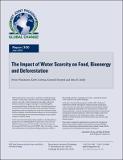The Impact of Water Scarcity on Food, Bioenergy and Deforestation
Author(s)
Winchester, N.; Ledvina, K.; Strzepek, K.; Reilly, J.M.
DownloadMITJPSPGC_Rpt300.pdf (3.821Mb)
Metadata
Show full item recordAbstract
We evaluate the impact of explicitly representing irrigated land and water scarcity in an economy-wide model on food prices, bioenergy production and deforestation both with and without a global carbon policy. The analysis develops supply functions of irrigable land from a water resource model resolved at 282 river basins and applies them within a global economy-wide model of energy and food production, land-use change and greenhouse gas emissions. The irrigable land supply curves are built on basin-level estimates of water availability, and the costs of improving irrigation efficiency and increasing water storage, and include other water requirements within each basin. The analysis reveals two key findings. First, explicitly representing irrigated land at has a small impact on food, bioenergy and deforestation outcomes. This is because this modification allows more flexibility in the expansion of crop land (i.e. irrigated and rainfed land can expand in different proportions) relative to when a single type of crop land is represented, which counters the effect of rising marginal costs for the expansion of irrigated land. Second, due to endogenous irrigation and storage responses, changes in water availability have small impacts on food prices, bioenergy production, land-use change and the overall economy, even with large scale (~150 exajoules) bioenergy production.
Date issued
2016-07Publisher
MIT Joint Program on the Science and Policy of Global Change
Citation
Report 300
Series/Report no.
MIT Joint Program Report Series;300